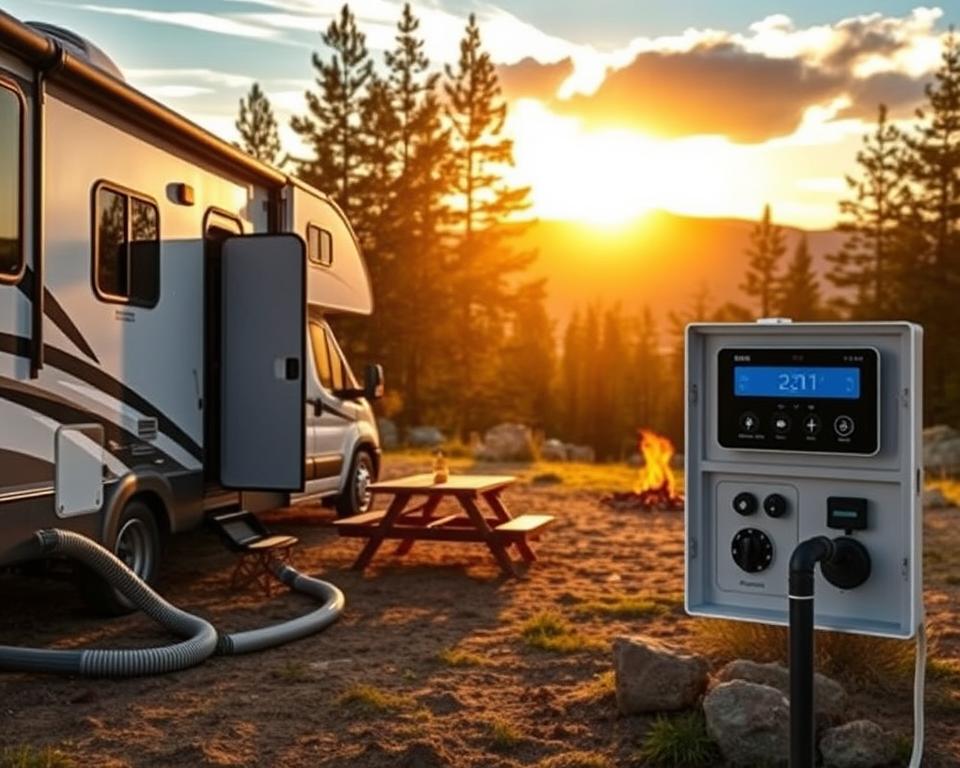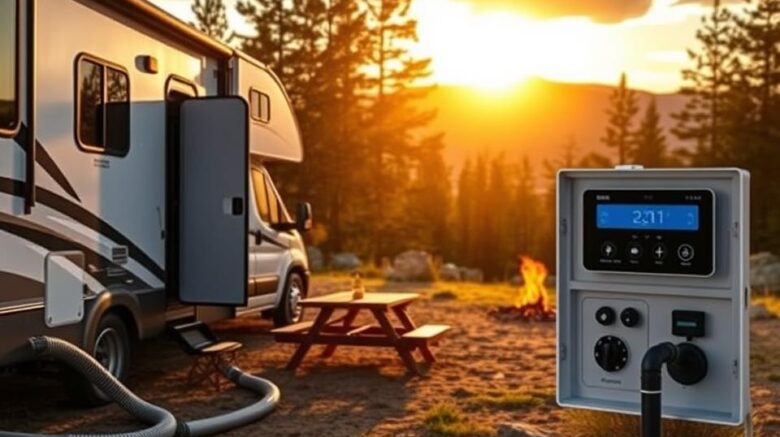RV Waste Removal: A Guide to Effortless Removal
Have you ever pondered about your RV’s waste management while enjoying the wilderness? Proper tank emptying is vital, often more than you think. It’s vital to have your motorhome’s waste system working well for trouble-free trips. In this overview, we cover RV sewage setups, the need for septic pumping, and top tips for stress-free excursions. With RV sewer pumping service services from All in Sanitation, your trips can be as splendid as your destinations.
Significant Notes
- Knowing your RV’s waste system matters greatly for effective septic service.
- Regular septic pumping prevents unpleasant surprises during your travels.
- Best practices can extend the life of your RV’s plumbing system.
- Rely on All in Sanitation for dependable RV waste solutions.
- Knowing when to pump helps ensure a hassle-free camping experience.
- Eco-friendly dumping practices reflect good RV stewardship.
Understanding RV Waste Systems
On-the-go waste setups in RVs play a vital role in sanitation. These systems typically comprise black and gray water storage. Black water tanks handle sewage from the bathroom. Gray water tanks manage dish and shower runoff. Understanding how each tank works enhances your disposal process.
Proper upkeep of these components is crucial. Neglecting scheduled emptying may result in blockages. This could spoil your camping trips. Ensure regular checks to keep both tank types functioning well.
Using a dependable black water service is key for proper tank emptying. Also, treatments tailored for RV systems can prolong tank life and avert bad smells. Proper care of your waste system boosts your RV experience significantly.
The Importance of RV Tank Emptying
Regular RV septic pumping is vital for the hygiene and functionality of your motorhome. Neglecting wastewater management leads to foul smells, blockages, and system breakdowns. Waste buildup is a health hazard due to bacteria and contamination. Thus, ongoing upkeep is indispensable.
Using a professional service like All in Sanitation ensures eco-friendly waste disposal. Their expertise guarantees safe, efficient handling of your waste. Staying on top of septic servicing keeps your trips worry-free. It ensures your road trips remain enjoyable, avoiding the dangers of overlooked RV septic pumping.
Determining RV Pumping Frequency
How often you empty tanks influences your RV’s sanitation. Regular timing avoids travel interruptions. Your pumping schedule depends on occupancy, tank capacity, and usage patterns.
If you camp sporadically, consider emptying black water tanks every few days. Full-time RV dwellers might need to pump more often due to more waste. Monitoring tank levels closely can improve your maintenance routine significantly.
Using tank treatments helps you gauge emptying times. Following these guidelines protects your sanitation apparatus. Preventing tanks from overflowing not only keeps your environment clean but also prolongs the plumbing lifespan of your RV.

Methods for RV Septic Pumping
RV owners have multiple dumping methods at their disposal. The macerating method employs a macerator pump creating a slurry for easier disposal. This facilitates easier disposal at dumping stations or designated areas. Its efficiency and convenience make it a popular choice.
Home septic dumping allows for emptying the RV’s holding tank directly into a residential septic system. It’s essential to verify local regulations to avoid non-compliance with waste disposal laws. Properly executed, it’s eco-friendly and compliant.
Gravity dumping uses gravitational force to release waste into a cleanout port, being the most straightforward method. Each method for RV septic pumping presents unique pros and cons. Knowing the differences helps you pick the right approach for clean and efficient disposal.
RV Waste Disposal Tools
Effective RV septic pumping requires appropriate tools. A top-notch sewer hose is vital for connecting your RV’s waste tank to the dump station. Flexibility and strength are crucial qualities. A good sewer hose simplifies waste disposal, making it less of a hassle.
Include a macerator pump in your gear list. They convert solids into liquid for easier dumping. They’re particularly useful where gravity can’t aid the emptying process.
Keep your waste tools in top condition. Rinse equipment after every job to prevent buildup. Storing them neatly ensures they’re always ready for use. Taking care of your equipment guarantees hygiene and efficiency during disposal tasks.
Top Tips for RV Sewer Maintenance
A tidy waste setup makes camping more enjoyable. Adhere to these tips for spotless sanitation. Start by always dumping black water first, then follow with gray water. Gray water flushes residual solids, keeping lines clear.
Choose enzyme or bacterial additives for superior breakdown. They maintain a balanced microbial ecosystem in your tanks. Avoid bleach or strong cleaners that harm your septic’s helpful microbes.
Regular rinsing prevents odor and debris buildup. Use separate hoses for black water to reduce contamination risks. It minimizes contamination risks and aids in maintaining system cleanliness.
To ensure best practices are consistently followed, adhere to this checklist:
- Dump black water first, then gray water.
- Apply microbial additives routinely.
- Avoid harsh chemicals that harm bacteria.
- Clean equipment thoroughly each time.
- Inspect the system regularly for leaks or issues.
Following these steps, RV owners can improve the life span and functionality of their wastewater systems. Resulting in stress-free outdoor adventures.
Mobile Home Septic Maintenance
Maintaining your mobile home’s septic system is crucial for its longevity and efficiency, much like those in RV waste systems. Regular upkeep prevents expensive repairs and guarantees a working septic system. It is recommended to pump the tank every three to five years, depending on how much you use it and its size.
Effective disposal methods are key to maintaining your septic system. Make sure to dispose of all waste and chemicals properly. Biodegradable solutions and level monitoring minimize harm. Steer clear of damaging cleaners that kill beneficial bacteria.
Scheduling regular professional inspections can catch potential problems early. Proactive inspections maintain seamless functionality. Following these guidelines keeps your home septic in peak shape.
RV Trailer Sewage Handling Guidelines
Effective trailer wastewater disposal is essential for a smooth RV experience. Start by finding designated dump stations on your route. Make sure these spots comply with local laws to avoid fines and environmental damage. Using camper-safe solutions boosts tank health and dumping ease.
Flushing with clean water helps clear tanks completely. A thorough rinse eliminates leftover sludge. This residue can cause odors and blockages. Plus, it aligns with green practices.
Advance planning is vital. Scheduling dump stops around your itinerary streamlines the process. This organization aids in streamlining the camper tank pumping process. Some useful tips for waste disposal include:
- Keep tabs on gauges to predict emptying times.
- Apply enzyme or bacteria-based solutions to decompose waste and boost tank performance.
- Protect yourself with gloves and sanitization after handling equipment.
RV Tank Additives Explained
Efficient waste management in motorhomes relies heavily on proper RV holding tank treatment. Formulations contain targeted microbes and enzymes. Designed to decompose solids efficiently. Using them regularly stops bad odors and ensures tanks stay clear, boosting overall performance.
Adding bio-treatments fosters a healthy septic ecosystem. They accelerate the natural decomposition process. Less frequent emptying prolongs service intervals.
Choose additives suited to your rig’s specs. Treatment options range widely. Eco-friendly options that work well with home septic systems are best. These choices maximize disposal efficiency and system health.
| Type of Treatment | Key Components | Advantages |
|---|---|---|
| Liquid Formulas | Bio-catalysts | User-friendly; powerful decomposition |
| Powdered Solutions | Enzymes | Cost-effective; long shelf life |
| Tablet Treatments | Pre-measured cultures | Convenient; pre-measured dosages |
Septic Service Errors to Dodge
Campers often stumble on simple dumping mistakes. Skipping regular pumping leads to surprises. This leads to a quickly filling tank and subsequent issues. Misusing cleaners harms beneficial bacteria. Leading to costly fixes and downtime.
Dumping tanks out of sequence is a typical error. Black-then-gray order matters most. Reversing the order invites leaks and smells. Avoid manual access to septic lids without professional help. Leave complex dumping tasks to experts for safety.
Moreover, neglecting equipment maintenance can cause leaks or clogs. Routine gear care supports clean, effective dumping. Awareness of these potential errors can streamline waste management. And keeps campsites fresh and hygienic.
The Bottom Line
An in-depth guide on RV septic pumping is vital for RV or mobile home owners. It makes road trips smoother. Consistent care and system knowledge boost your adventure quality. Using proper disposal techniques and having necessary tools will lead to worry-free adventures.
Partnering with All in Sanitation brings peace of mind. Their skilled team manages waste with precision and care. Thus, you can immerse yourself in the joy of your travels and craft unforgettable moments.
Routine tank emptying is fundamental to conscientious camping. It combines the spirit of exploration with the assurance of a tidy, odor-free environment. This balance ensures a pleasant experience for you and your companions on every journey.
